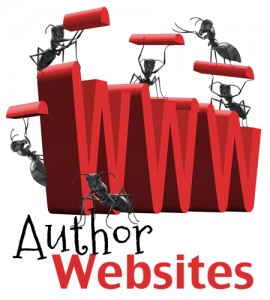On 7 January, 2016, I asked Google, “what religion is Barack Obama”? After considering the problem for .42 seconds, Google offered more than 34 million “results.” The most obvious answer was at the top, accentuated by a rectangular border, with the large word “Muslim.” Beneath that one word read the line, “Though Obama is a practicing Christian and he was chiefly raised by his mother and her Christian parents…” Thank you, Google.
The post What religion is Barack Obama? appeared first on OUPblog.
This month-long series of blog posts will explain author websites and offer tips and writing strategies for an effective author website. It alternates between a day of technical information and a day of writing content. By the end of the month, you should have a basic author website up and functioning. The Table of Contents lists the topics, but individual posts will not go live until the date listed. The Author Website Resource Page offers links to tools, services, software and more.
If You Build It, They Will NOT Come Unless. . .

. . . unless they can find you in a search engine. The number of people who find your site because they know you will be few. Those who intuitively type in darcypattison.com must have some knowledge of who I am. You need links from other sites and you need search engine traffic.
Search Engine Optimization or SEO. There’s no way in a simple blog that I can explain everything about how to get search engines to send people your way. There are books and professionals who can barely explain it. So let me do a quick explanation and then give you one big hint.
First, SEO is all about making it easy for search engines to index your site and figure out what you are talking about. If someone types into a search engine “best practices author website,” I want this series to come up. How does a search engine decide what to show for this question? The situation is hard, because search engines are constantly updating the algorithms or mathematical formulas used to decide this question; the answer is a moving target. (These updates from Google get colorful names such as the Panda update. For the most recent, as of the date of this writing, look for information on the Hummingbird update.) Still, there are a couple constants, keywords and titles.
Keywords just means what are you talking about, but it’s in terms of what people actually search for, not what you think it should be. For years, keyword research has been crucial because of the difference in searching for “childrens’s books” or “kid’s books.” With the increased sophistication of search engines, though, the two would now return the same blog posts. But it still makes a difference is you search for “best practices” or “great examples” of author websites. Now, search engines try to answer the underlying question and intent of the question. Do you want a list of tutorials on building a website, or do you want examples of great websites?
Once you decide on the topic of a post, make sure to use the words somewhere in the post. Two years ago, experts might have suggested you seed the post with the keywords, but now, most agree that a couple times is enough, as long as you are answering a key question. This means: before you write a post, think about what questions your reader might have on the topic and try to answer those questions.

In today’s crowded Internet, how will you make your website stand out to search engines?
As writers, this is a snap. You must write good titles that explain what is in the post. Nothing cutesy, but direct, succinct and catchy.
Let’s say you want to know what to include on your ABOUT page.Which of these post titles would you click on?
The last, of course, is the title of the post I wrote on ABOUT pages. In writing titles, think about a long list of titles and what will make yours stand out.
Specific. Be specific. I reference two authors named Kate and that intrigues.
Numbers. Titles with numbers often get better results.
Adjectives. “creative, intriguing” will pull in more readers.
How To. Promising to explain something is important to readers, especially is you pull off the explanation well.
You know that comment you always get from editors on the rejection letters? “. . this manuscript just didn’t stand out in today’s crowded market. . .” Think of search engines as that crowded marketplace and your title as a log line or the briefest elevator pitch (you only get 100 characters or so). Make the title snappy.
And–after you’ve got everything set up and you want a couple more tasks to do, study SEO. The year I did that, I doubled my website’s traffic. It’s that important. But you’ve got time to get everything set up right before you have to stress out over this. Just know that SEO is in your future.

Hands down, the Internet beats the old days when writers had to go to the library to research a topic. Now anyone can retrieve information with a few computer clicks. I frequently use Google in my searches and have discovered the following ways to improve results:
- Use the asterisk (*) as a wild card with the words you’re searching. For example, if you wanted to search for me on the Web but couldn’t remember my last name but knew I was a children’s author, you could type Ronica * children’s author and related sites would pop up, providing my last name.
- Use the minus sign before words you want to exclude from the search. Using a similar example, if you searched solely on my first name, Ronica, and a bunch of “Ronica Smith” sites showed up, you could eliminate Ronica Smith from your search by typing Ronica -Smith.
- Put quotation marks around a word or two (such as “Ronica Stromberg”) to pull up sites only with the word (or words) as quoted.
- To find the word you’re searching for on a Web site that came up, hit Control-F (Command-F on a Mac) and enter the word you’re searching for again. This will highlight the word you’re searching for. I’ve found this useful when a Web site has page after page of text but no clear indication where the word or phrase I’m searching for may be.
- To restrict search results to a specific URL, add site: in front of the URL. For example, dognapper site:nytimes.com would pull articles printed about dognappers at The New York Times domain.
- To find sites similar to one you’re using, type related: before the URL of the site (as in related:nytimes.com).
- Use two periods between numeric ranges to find information about a range. For example, if you wanted to find information about gasoline prices between 1970 and 1980, you could type gasoline prices 1970 . . 1980. Writers of historical novels may find this particularly useful for research.
- To use Google as a dictionary and look up the definition of a word, type define: immediately followed by the word.
- To find the current weather in a town (in case you are about to set off on a book talk or other trip), type weather in followed by the town’s name.
- To convert currency or measurements, use search formats such as 50 pesos in US dollars or 100 kilometers in miles.
- To find the title of a song that lyrics come from, type some of the more distinct lyrics followed by :lyric. For example, when I type want to be a paperback writer:lyric, several sites appear, letting me know this line of lyrics comes from the Beatles’ “Paperback Writer” song.
- To get alerted about breaking news on a topic, go to http://www.google.com/alerts and enter the topic and your e-mail address. Google will then e-mail you the next time news on the topic appears on the Internet. I know a lot of authors type their name or key words from their works into this site to track online publicity and, also, to check whether their writing is being plagiarized.
Instead of doing a general search of the whole Internet, I may have only a specific area I want to search. The following are my favorites.
blogs http://www.google.com/blogsearch
books http://books.google.com/
finance http://www.google.com/finance This search of the latest financial news may be of particular interest to business and financial writers.
images http://images.google.com This site can be misleading. When I searched on “F. Scott Fitzgerald,” the name of one of my favorite authors, photos of him–and a bunch of other people–cropped up. Had I not already known what F. Scott Fitzgerald looked like, the site wouldn’t have helped much.
news http://news.google.com/
patents http://www.google.com/?tbm=pts
videos http://www.google.com/videohp


....I know, I can hardly believe this myself, but apparently there are things that other search engines do better than Google. Or at least one thing: finding out what real time (i.e. now) discussions are going on.
If you have ever wondered how a journalist can write with authority about the topic the country was tweeting about yesterday afternoon this is how - they looked it up on collecta.com
Right now - at this very moment - the hot topics are
- Inception
- The Tour de France
- Lindsay Lohan
- Oil Seep
- Steve Jobs





